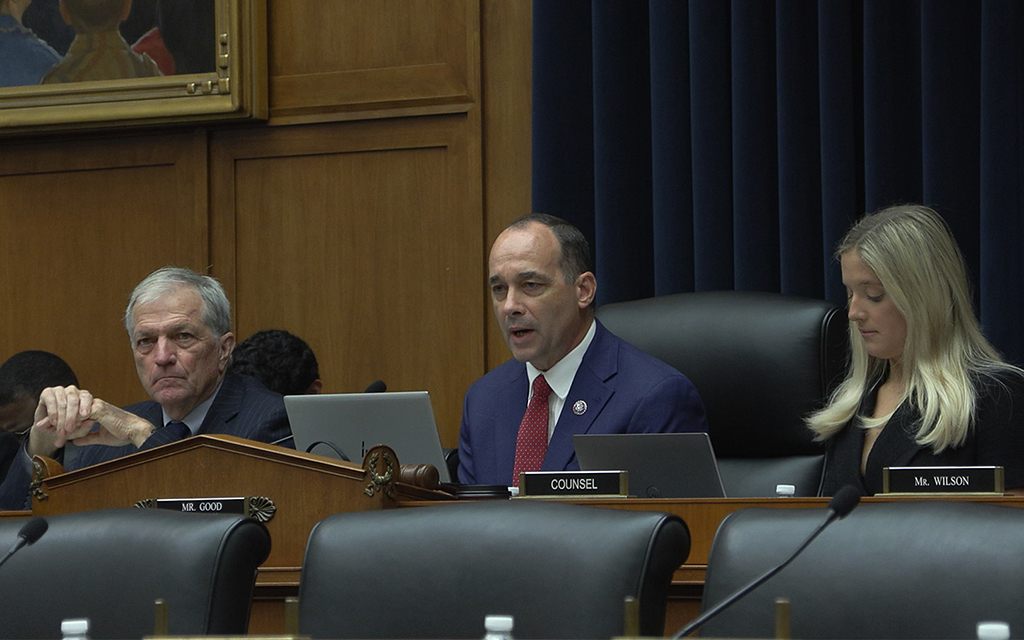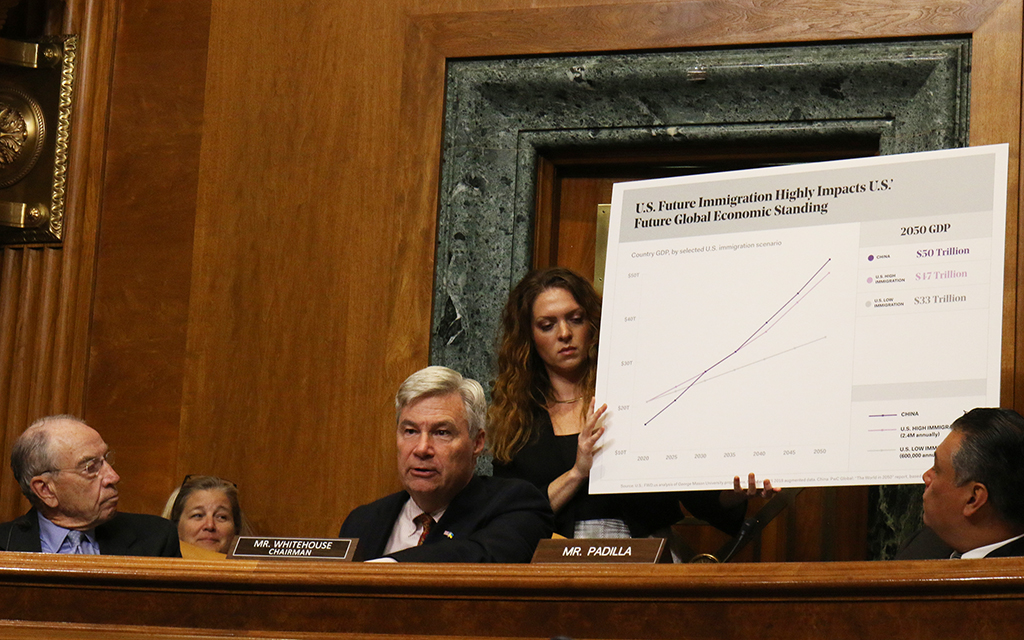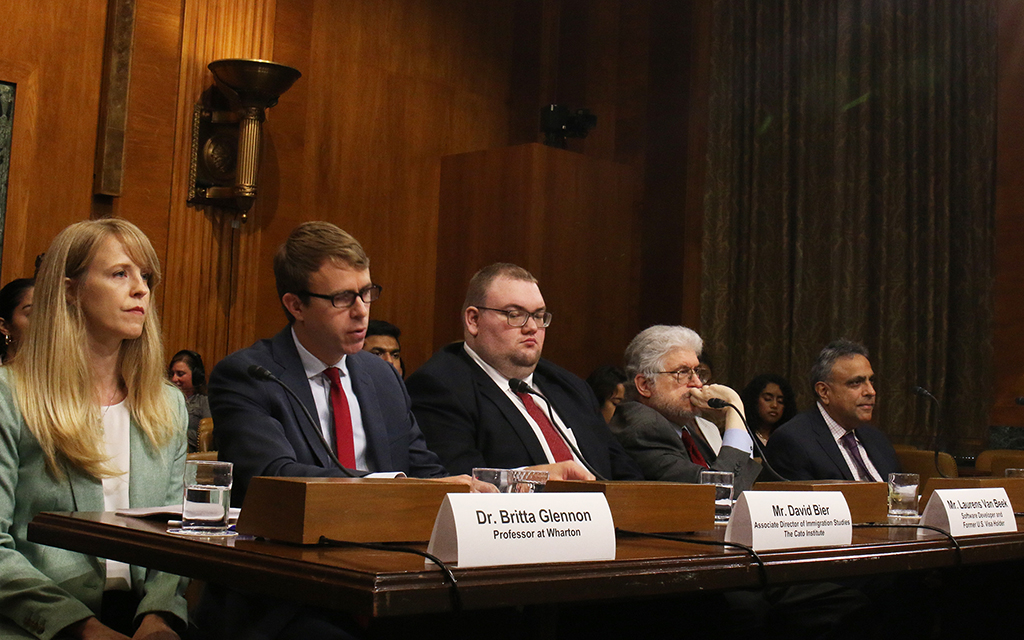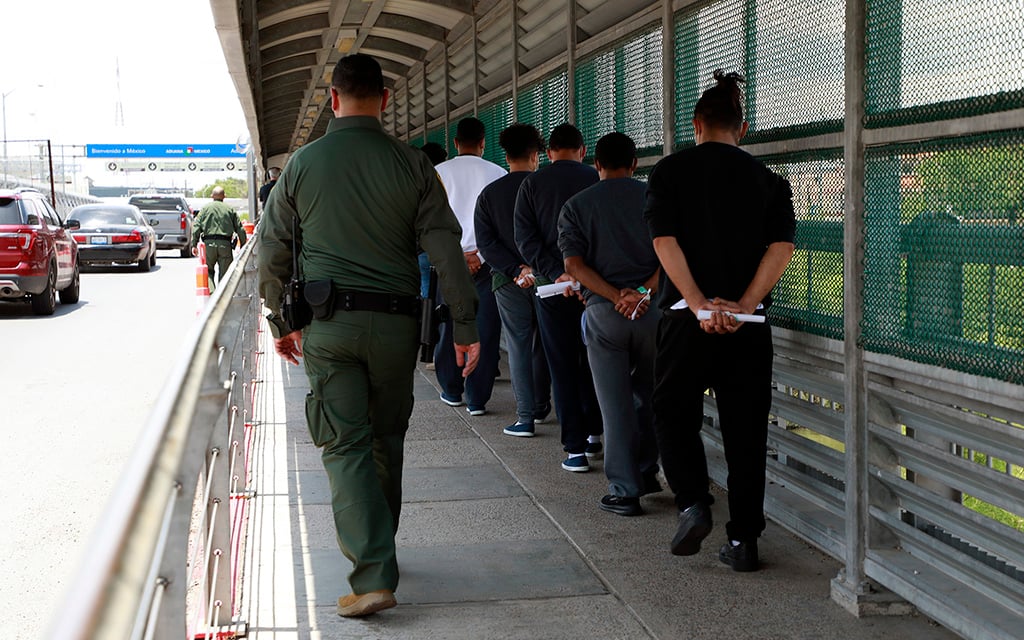
Rep. Bob Good, R-Va., center, took the GOP line, blaming immigrants for taking U.S. jobs, among other ills, while Rep. Mark DeSaulnier, D-Calif., left, accused Republicans in the hearing of “dangerous rhetoric.” (Photo by Renee Romo/Cronkite News)

Sen. Sheldon Whitehouse, D-R.I., made the case that migrants boost the U.S. economy, saying immigration, and a pathway to citizenship, is “not only a moral imperative, it is an economic one.” (Photo by Adrienne Washington/Cronkite News)
WASHINGTON – Will the flow of migrants into the U.S. “grow our workforce, our productivity, and our economy” or is it “unchecked, unfettered, illegal immigration” that depresses wages and takes jobs?
In Washington, it can be both.
While two committees held two hearings on the same topic Wednesday, the hearings in the Democrat-controlled Senate and the GOP-led House came to two very different conclusions. Washington observers were not surprised.
“(The) two parties have a pretty different approach to specifically immigration policy,” said David Bier, associate director of immigration studies at the Cato Institute. “So it’s not surprising that there would be quite different outcomes and perspectives being presented at a House hearing versus a Senate hearing.”
That difference was evident even in the names of the two hearings. While a House subcommittee met to discuss “The impact of Biden’s open border on the American workforce,” senators talked about “Unlocking America’s potential: How immigration fuels economic growth and our competitive advantage.”
Sen. Sheldon Whitehouse, D-R.I., set the tone for the Senate Budget Committee hearing with an opening statement that called migrant workers a “powerful tool in our toolkit” to improving America’s economy and decreasing the national debt.
“Providing pathways to lawful immigration and citizenship is not only a moral imperative, it is an economic one,” said Whitehouse, the chairman of the committee.
Britta Glennon, a professor at the University of Pennsylvania’s Wharton School, testified that research by her and other academics indicates that the current immigration system is putting the country at a competitive disadvantage.
“The U.S.’s restrictive immigration policies send jobs and investment to other countries, especially China, India and Canada,” said Glennon, who is also a faculty research fellow at the National Bureau of Economic Research.
“Policy makers should consider that restrictive immigration policies, including those implemented to protect U.S. jobs, are actually likely to have the unintended consequence of pushing U.S. business investment abroad,” she testified.
That was echoed by other speakers, including Bier, who said in his prepared remarks that immigrants “aren’t competitors” but “collaborators” who can help reverse falling population levels, fill empty jobs and create demand for goods and services.
On the other side of Capitol Hill, by contrast, a House Education and the Workforce subcommittee saw things differently. Rep. Bob Good, R-Va., opened the hearing by saying “America’s workforce and economy cannot flourish with the unchecked, unfettered, illegal immigration that is Biden’s border invasion.”
“Illegal aliens are competing against Americans for American jobs. Illegal workers provide many advantages for some employers, since they cost zero additional dollars in taxes, and often accept lower wages for more work,” Good, the chairman of the Subcommittee on Health, Employment, Labor and Pensions, said in his opening statement.
That was the tone for much of more than two hours of testimony that ranged from the immigrant workforce to the trafficking of drugs and children, fraudulent asylum claims and – most often – the claim that immigrants take jobs from native-born Americans and lower wages in the process.
“There is good evidence that immigration does reduce the wages and employment of some U.S.-born workers, though it’s difficult to distinguish the impact of illegal immigration from immigration overall,” said Steven Camarota, director of research for the Center for Immigration Studies, in his testimony.
As in the Senate hearing, most of the testimony in the House aligned with the majority of the lawmakers on the committee, with one witness in each hearing presenting an opposing view.

Britta Glennon, left, and David Bier, next to her, were among that witnesses at the Senate Budget Committee hearing who said migrant workers help the U.S.. economy, and that turning them away boosts our economic competitors. (Photo by Adrienne Washington/Cronkite News)
“You have one party that controls the House and another party that controls the Senate and because of that they control the chairs of the committees, which then allows them to set the agenda for the hearings that happen,” said Erin Covey, an analyst for Inside Elections.
“So that’s why you see two very different hearings in terms of their tone, and in terms of the way that it’s framed, and the witnesses they bring forward,” Covey said.
Democrats were quick to call the House hearing little more than “political theater,” a characterization that disappointed freshman Rep. Aaron Bean, R-Fla.
“I thought this was going to be it. I thought that this was going to be the issue that ties the two sides that are up here,” Bean said at the hearing. “And you can see we are apart on so many issues, but this was the one, this was the issue that is literally destroying our country, an open border.”
Democrats agreed on one thing – the two sides are far apart.
“Unfortunately, I’m concerned that we are using our time here today to talk in dangerous rhetoric that fuels racial and prejudice conspiracy theories, rather than focus on the extremely important work for American families and the workforce,” said Rep. Mark DeSaulnier, D-Calif.


